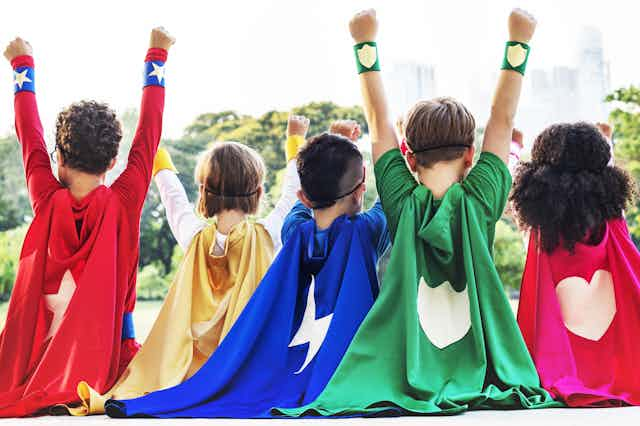From Harry Potter to Matilda, Where’s Wally to Mary Poppins on World Book Day, children across the UK go to school dressed as their favourite fictional characters.
Launched in 1995, World Book Day allows children and schools to celebrate and explore the pleasures of books and reading. And research shows it seems to be having an impact.
A survey conducted by the National Literacy Trust of more than 9,000 pupils age between eight and 11 (Key Stage Two) found that almost 60% of children were inspired to read more by the celebration of books and reading.
The data also showed that World Book Day has resulted in more children buying books – one in four pupils (25%) said the book they “bought” with their 2016 World Book Day book token was the first book they had of their own.
Among children receiving free school meals, this number increased to three in ten (33%). This means that without World Book Day a quarter of the UK’s eight-to-11 year-old children would not own a book.
The power of play
In the minds of many though, the days is best known for the memorable and creative costumes that children dress up in to mark the occasion.
Popular costume ideas for this year feature Paddington Bear and Peter Rabbit – the books of which have recently been made into films – and similarly there is likely to be a few children dressed as Rey from Star Wars. She features in the books and films from the latest Trilogy and has been hailed as a positive and empowering character for girls and young women.
Rey has been called a “game changer for the little girls around the world”. She is described by the writer Casey Cipriani as:
A woman leader who is badass, yes, but also realistically complex.
A feminist role model
To get more of an idea of what parents and children themselves think of dressing up and the character Rey, our recently launched research project looks at ideas around girls cosplaying– short for costumes play – or dressing as Rey. As part of the project, parents and girls age five to 14 will fill in a survey, and the girls will also draw themselves dressed as Rey.
In the first responses to our study, we can already see that one of the most common words that girls use to describe Rey so far is “brave”, along with strong and bold. One girl explains that dressing as Rey makes her feel fearless and adventurous. But girls also talk about Rey’s kindness. They like the fact that Rey is thoughtful and “talks to others about plans that they will make”.
Some of the parents who have participated in our research have themselves been Star Wars fans since childhood. Leia from the original trilogy is mentioned by one as a girlhood hero, and we can see Rey as a new iteration of this. One parent writes that dressing as Rey gives her daughter “a sense of possibility, that she can be brave too”.
Making sense of the world
Responses from some parents suggest that feminist role models in books, films and the media in general play an important role in their parenting of girls. One parent said they seek out strong female role models, who are “not afraid to stand up for what they believe in”.
In our research we are also asking parents about the social challenges they think girls and women face. A wide range of things have been highlighted – from social media pressures to equal pay. Dressing as Rey doesn’t provide simple solutions to these problems, but early results from our study suggest that costumes provide moments for families to talk and think about bigger issues and anxieties in the world.
It is clear then that children dressing up – whether for World Book Day, ComicCon, parties, or just for fun – is more than just enjoyable escapism. Which is why it’s important that when dressing up, children have the freedom to choose a costume that inspires them and allows them to imagine the kind of person they might want to be.

